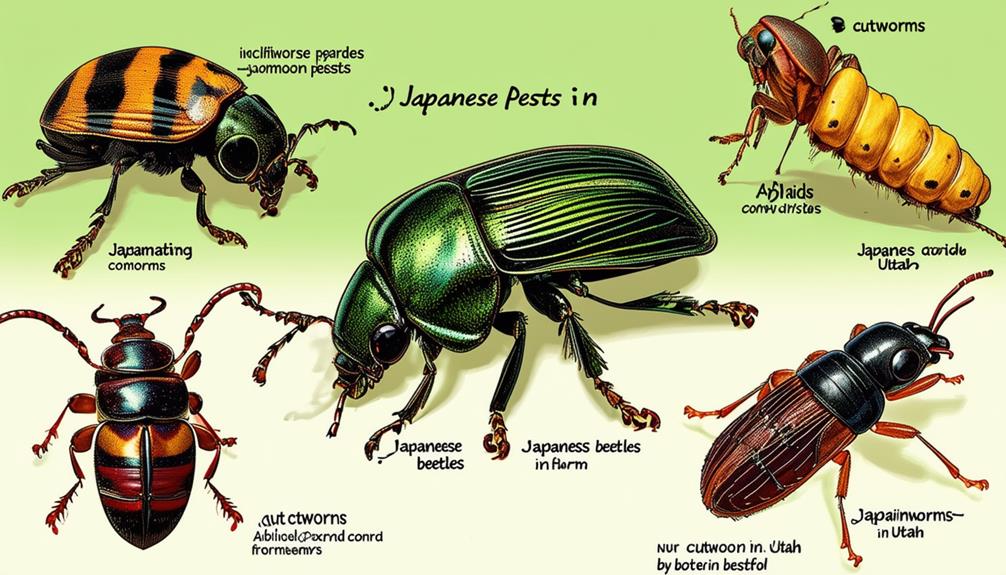Effective mosquito control on your organic farm or garden in Southern Utah is essential. Implement natural water management techniques like swales and native plants to reduce breeding sites. Introduce mosquito predators such as dragonflies and bats to control populations organically. Utilize natural repellents like citronella and plant herbs for protection. Promote biodiversity with native plantings to attract beneficial insects. Create diverse habitats and companion plant strategically to keep mosquitoes at bay. These methods offer sustainable and eco-friendly solutions for managing pests. Further exploration into control strategies can enhance your organic farming practices.
Key Takeaways
- Implement natural water management techniques to reduce mosquito breeding sites.
- Introduce mosquito predators like dragonflies and fish for biological control.
- Use natural mosquito repellents such as citronella and lavender oils.
- Promote biodiversity with native plantings to attract beneficial insects.
- Employ companion planting strategies with herbs like basil and mint for natural mosquito control.
Importance of Mosquito Control

Why is mosquito control important for organic farms and gardens in Southern Utah?
Pest control is crucial for maintaining the health and productivity of your organic crops. Mosquitoes not only pose a threat to human health by spreading diseases like West Nile virus and Zika virus but can also harm your plants.
Ensuring effective mosquito control measures will make sure that your farm remains a safe and comfortable environment for workers, visitors, and residents. These pesky insects can cause stress and discomfort to your plants, impacting their growth and overall yield.
Organic farms and gardens rely on natural methods of pest control to avoid contamination from chemical pesticides and uphold the integrity of their produce. By implementing proper mosquito control practices, you can enhance the sustainability and success of your organic farming operations in Southern Utah.
Make sure to prioritize mosquito control to protect both your crops and your community.
Natural Water Management Techniques
To effectively manage water naturally on organic farms and gardens in Southern Utah, consider implementing sustainable techniques like rainwater harvesting and drip irrigation. These methods not only promote water conservation but also help maintain ecological balance on your property. Here are some practical water management techniques to aid in sustainable agriculture practices and mosquito prevention:
- Swales and Berms: Design these features to capture and divert excess water, reducing standing water where mosquitoes lay eggs.
- Native Drought-Tolerant Plants: Utilize plants that promote water absorption and prevent water pooling, creating inhospitable conditions for mosquitoes.
- Water-Permeable Surfaces: Install gravel or permeable pavers to minimize water accumulation and reduce mosquito breeding sites.
- Proper Grading and Slope: Implement correct methods to ensure efficient water drainage, preventing stagnation and lowering mosquito populations.
Introduction of Mosquito Predators

Introducing mosquito predators such as dragonflies, bats, and fish into your environment can play a vital role in controlling mosquito populations naturally.
Dragonflies, known for their voracious appetite, can consume hundreds of mosquitoes daily, aiding in effective biological control.
Bats, active during the night, contribute to reducing mosquito numbers by preying on them during their flights, while fish species like gambusia help by consuming mosquito larvae, halting their development.
Natural Mosquito Predators
Natural mosquito predators such as dragonflies, bats, and fish play an essential role in effectively controlling mosquito populations in Southern Utah farms and gardens.
- Dragonfly Benefits: Dragonflies are voracious predators of mosquitoes, capable of consuming hundreds of them daily, making them valuable allies in mosquito control efforts.
- Bat Conservation: Bats are pivotal for controlling mosquito populations as they feed on large numbers of mosquitoes during their nightly flights, contributing notably to reducing mosquito numbers in the area.
- Fish Populations: Species like gambusia, commonly known as mosquito fish, feed on mosquito larvae in water bodies, effectively decreasing the adult mosquito population and offering a natural way to manage mosquito numbers.
- Eco-Friendly Solutions: Incorporating these natural predators into organic farms and gardens provides sustainable and environmentally friendly mosquito control methods.
Biological Control Methods
Incorporating biological control methods through the introduction of mosquito predators like dragonflies, fish, and birds offers sustainable solutions for managing mosquito populations in Southern Utah farms and gardens. Dragonflies are efficient predators of mosquitoes, consuming large numbers of adult mosquitoes. Fish species such as Gambusia and Koi can be introduced into water bodies to eat mosquito larvae. Birds like purple martins and swallows are known for feeding on flying insects, including mosquitoes, contributing to pest management.
Implementing these natural alternatives promotes ecological balance, reduces the environmental impact of chemical insecticides, and aligns with organic practices. By enhancing the presence of mosquito predators, you can effectively control mosquito populations while maintaining a healthy and balanced ecosystem on your farm or garden.
Ecosystem Balance Benefits
Enhancing your farm or garden’s biodiversity with mosquito predators like dragonflies, bats, and birds is a vital strategy for maintaining a balanced ecosystem and controlling mosquito populations naturally.
- Predator-prey relationships play an essential role in ecological balance.
- Integrated pest management promotes sustainable agriculture practices.
- Conservation biology is supported through the introduction of natural mosquito predators.
- Ecosystem services provided by mosquito predators help in managing mosquito populations effectively.
Utilizing Natural Mosquito Repellents

You can effectively deter mosquitoes by utilizing natural options like citronella, lavender, and eucalyptus oils.
Planting herbs such as basil, mint, and lemongrass can also create a protective shield against these pests.
Consider making your DIY mosquito sprays using these natural repellents for a chemical-free solution to control mosquito populations.
Herbal Repellent Options
Using herbal repellents such as citronella, lavender, peppermint, and eucalyptus presents a natural and effective way to repel mosquitoes on Southern Utah farms and gardens.
- Herbal repellent recipes: Create your own natural mosquito repellent by mixing essential oils from herbs like rosemary and basil with a carrier oil like coconut or olive oil.
- Organic pest management: Herbal repellents provide a safe and eco-friendly solution for managing mosquito populations without harmful chemicals.
- Sustainable insect control: By incorporating mosquito-repelling herbs into your garden, you can establish a sustainable method of controlling insects while promoting biodiversity.
- Plant-based protection: Utilizing herbal repellents not only safeguards your crops and plants but also contributes to a pesticide-free environment in organic farming practices.
DIY Mosquito Sprays
Utilizing natural mosquito repellents such as essential oils like citronella, lavender, and eucalyptus can effectively deter mosquitoes on organic farms and gardens in Southern Utah.
DIY mosquito sprays offer homemade solutions that provide effective results in mosquito control. By mixing these essential oils with water or a carrier oil, you can create eco-friendly DIY repellent recipes that are safe for organic farming.
These natural insect deterrents not only help in repelling mosquitoes but also offer organic farming benefits by providing a markedly reduced mosquito populations, making them a practical and sustainable option for mosquito control on organic farms and gardens in Southern Utah.
Promoting Biodiversity for Control
Promoting biodiversity on organic farms and gardens in Southern Utah plays a substantial role in naturally controlling mosquito populations. By diversifying the flora and fauna in your farming or gardening space, you can create a balanced ecosystem that keeps mosquito numbers in check.
Here’s how you can enhance biodiversity for effective mosquito control:
- Native Planting Benefits: Planting a variety of native plants not only beautifies your space but also attracts beneficial insects like dragonflies and damselflies that feed on mosquitoes.
- Biodiversity Advantages: Maintaining a diverse range of plants and habitats provides shelter and food sources for a multitude of species, encouraging a healthy predator-prey balance that naturally controls mosquito populations.
- Natural Pest Control: Creating diverse habitats such as wetlands and ponds supports the presence of natural predators like fish and amphibians that consume mosquito larvae, reducing their numbers significantly.
- Companion Planting Strategies: Implement companion planting with herbs like basil and mint, which not only serve as natural mosquito repellents but also enhance biodiversity by attracting pollinators and other beneficial insects to your farm or garden.
Creating Habitats for Beneficial Insects

To attract beneficial insects that aid in controlling pest populations, creating diverse habitats with native plants is essential. Pollinator gardens filled with a variety of flowering plants rich in nectar and pollen will attract beneficial insects like ladybugs, lacewings, and parasitic wasps. These insects prey on harmful pests, reducing the need for chemical interventions.
Incorporating habitat diversity by planting a mix of flowers, shrubs, and trees provides different food sources and shelter options for beneficial insects. Installing insect shelters, such as bee boxes and bug hotels, offers additional refuge for these helpful insects to thrive in your garden. Companion planting techniques, like interplanting marigolds among vegetables, can further enhance insect diversity in the ecosystem.
Frequently Asked Questions
How Do I Keep Mosquitoes Out of My Vegetable Garden?
To keep mosquitoes out of your vegetable garden, use natural repellents like citronella, marigolds, and garlic. Try companion planting with herbs like basil and mint. Manage water by eliminating standing water sources and introducing mosquito fish to control populations.
What Kills Mosquitoes the Best Naturally?
To naturally kill mosquitoes, consider using essential oils like citronella, planting mosquito-repellent plants, and setting up mosquito traps with UV light. These methods offer effective and eco-friendly ways to control mosquito populations in your area.
How Do I Rid My Garden of Mosquitoes?
To rid your garden of mosquitoes, utilize natural repellent options like essential oils, plant citronella, lavender, and marigolds, and set up DIY mosquito traps. Implement these plant-based solutions to keep your garden mosquito-free.
What Is the Best Thing to Keep Mosquitoes Away From Outside?
To keep mosquitoes away from outside, use natural repellents like essential oils, plant mosquito-repelling plants, and install outdoor lighting. These methods help deter mosquitoes effectively, creating a more pleasant environment for you to enjoy outdoors.




